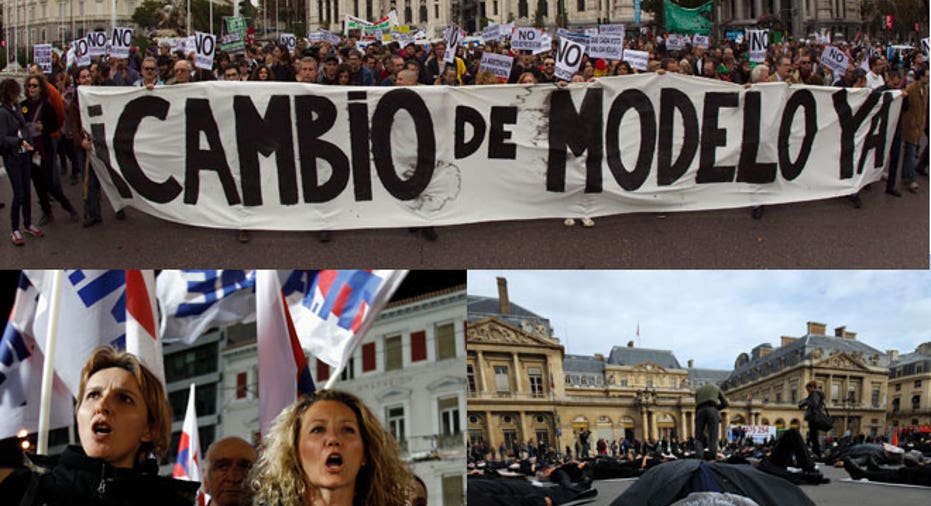Tumult in Europe: Protests in Greece, Pain in France and Spain

Greek police clashed with anti-austerity protesters and Italy announced sweeping reforms in response to a European debt crisis that on Thursday pushed borrowing costs for France and Spain sharply higher.
More than 30,000 Greeks took to the streets of Athens in a protest rally that marked the first public test for a new national unity government that must impose painful spending cuts and tax rises if the country is to escape bankruptcy.
Greek police fired tear gas against black-clad youths as protest marchers beat drums, waved red flags and shouted: "EU, IMF out!"
Italy's new Prime Minister Mario Monti unveiled sweeping reforms to dig the country out of crisis and said Italians were confronting a "serious emergency." Opinion polls show Monti enjoys 75 percent support but there were street clashes in the business capital of Milan and in Turin.
"Only if we can avoid being seen as the weak link of Europe can we contribute to European reforms," said Monti, who was sworn in on Wednesday as head of a technocrat government after a rushed transition from discredited ex-premier Silvio Berlusconi.
The Spanish government was forced to pay the highest borrowing costs since 1997 at a sale of 10-year bonds, with yields a steep 1.5 points above the average paid at similar tenders this year, drawing descriptions from the market ranging from "pretty awful" to "dreadful."
The euro fell in response. Paris fared a little better, but again had to pay markedly more to shift nearly 7 billion euros of government paper. Fears that the euro zone's second largest economy is getting sucked into the debt maelstrom have taken the two-year crisis to a new level this week.
"The euro zone has got to deliver something which is going to calm markets down and at the moment markets feel like they are being given no comfort whatsoever," said Marc Ostwald, strategist at Monument Securities.
In Rome, Monti outlined a broad raft of policies including pension and labor market reform, a crackdown on tax evasion and changes to the tax system in his maiden speech to parliament ahead a confidence vote to confirm backing for his technocrat government.
With Italy's borrowing costs now at untenable levels, Monti will have to work fast to calm financial markets given Italy needs to refinance some 200 billion euros ($273 billion) of bonds by the end of April.
Ireland, which has been bailed out and gained plaudits for its austerity drive, will also be forced to do more. Dublin will increase its top rate of sales tax by two percent in next month's budget, documents obtained by Reuters showed.
But no amount of austerity in Greece, Italy, Spain, Ireland and France is likely to convince the markets without some dramatic action in the shorter term, probably involving the European Central Bank.
Many analysts believe the only way to stem the contagion for now is for the ECB to buy up large quantities of bonds, effectively the sort of 'quantitative easing' undertaken by the U.S. and British central banks.
France and Germany have stepped up their war of words over whether the ECB should intervene more forcefully to halt the euro zone's debt crisis after modest bond purchases have failed to calm markets.
Facing rising borrowing costs as its 'AAA' credit rating comes under threat, France has urged stronger ECB action but Berlin continues to resist, saying European Union rules prohibit such action.
"If politicians think the ECB can solve the euro crisis, then they are mistaken," German Chancellor Angela Merkel said. Even if the ECB assumes a role as lender of last resort, it would not solve the crisis, she said.
Investors and euro zone officials hope that if Merkel and others find themselves staring into the abyss, the unthinkable will rapidly become thinkable.
"The Germans have made some remarkable changes to their position over the past few months, you have to give them credit for that, it just takes rather a long time. It's Chinese torture," one euro zone central banker told Reuters. "They are not drawing lines in the sand as clearly as they were."
BANKS UNDER THE COSH
With turmoil reaching a crescendo, euro zone banks are finding it harder to obtain funding. While the stresses are not yet at the levels during the 2008 financial crisis, they have continued to mount despite ECB moves to provide unlimited liquidity to banks.
Fitch Ratings warned it might lower its "stable" rating outlook for U.S. banks because of contagion from problems in troubled European markets.
Fellow ratings agency Moody's cut ratings of 12 German public-sector banks, believing they are likely to receive less federal government support if needed.
German Finance Minister Wolfgang Schaeuble said on Thursday that the euro zone's debt crisis was beginning to hit the real economy and urged vigilance to prevent contagion from infecting banks and insurance firms.
($1 = 0.734 Euros)



















